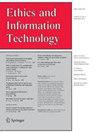Smart cities as a testbed for experimenting with humans? - Applying psychological ethical guidelines to smart city interventions
IF 3.4
2区 哲学
Q1 ETHICS
引用次数: 0
Abstract
Abstract Smart Cities consist of a multitude of interconnected devices and services to, among others, enhance efficiency, comfort, and safety. To achieve these aims, smart cities rely on an interplay of measures including the deployment of interventions targeted to foster certain human behaviors, such as saving energy, or collecting and exchanging sensor and user data. Both aspects have ethical implications, e.g., when it comes to intervention design or the handling of privacy-related data such as personal information, user preferences or geolocations. Resulting concerns must be taken seriously, as they reduce user acceptance and can even lead to the abolition of otherwise promising Smart City projects. Established guidelines for ethical research and practice from the psychological sciences provide a useful framework for the kinds of ethical issues raised when designing human-centered interventions or dealing with user-generated data. This article thus reviews relevant psychological guidelines and discusses their applicability to the Smart City context. A special focus is on the guidelines’ implications and resulting challenges for certain Smart City applications. Additionally, potential gaps in current guidelines and the limits of applicability are reflected upon.智慧城市是人类实验的试验台?-在智慧城市干预中应用心理伦理准则
智慧城市由大量相互连接的设备和服务组成,以提高效率、舒适度和安全性。为了实现这些目标,智慧城市依赖于各种措施的相互作用,包括部署旨在促进某些人类行为的干预措施,例如节约能源,或收集和交换传感器和用户数据。这两个方面都涉及伦理问题,例如,当涉及到干预设计或处理与隐私相关的数据(如个人信息、用户偏好或地理位置)时。由此产生的担忧必须认真对待,因为它们降低了用户的接受度,甚至可能导致原本有希望的智慧城市项目被取消。在设计以人为中心的干预措施或处理用户生成的数据时,已建立的伦理研究和实践指南为各种伦理问题提供了有用的框架。因此,本文回顾了相关的心理学指南,并讨论了它们在智慧城市背景下的适用性。特别关注指南的含义和对某些智慧城市应用的挑战。此外,还反映了现行准则的潜在差距和适用性限制。
本文章由计算机程序翻译,如有差异,请以英文原文为准。
求助全文
约1分钟内获得全文
求助全文
来源期刊

Ethics and Information Technology
Multiple-
CiteScore
8.20
自引率
5.60%
发文量
46
期刊介绍:
Ethics and Information Technology is a peer-reviewed journal dedicated to advancing the dialogue between moral philosophy and the field of information and communication technology (ICT). The journal aims to foster and promote reflection and analysis which is intended to make a constructive contribution to answering the ethical, social and political questions associated with the adoption, use, and development of ICT. Within the scope of the journal are also conceptual analysis and discussion of ethical ICT issues which arise in the context of technology assessment, cultural studies, public policy analysis and public administration, cognitive science, social and anthropological studies in technology, mass-communication, and legal studies.
 求助内容:
求助内容: 应助结果提醒方式:
应助结果提醒方式:


